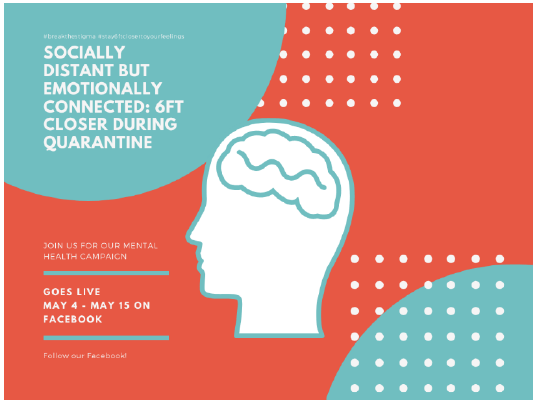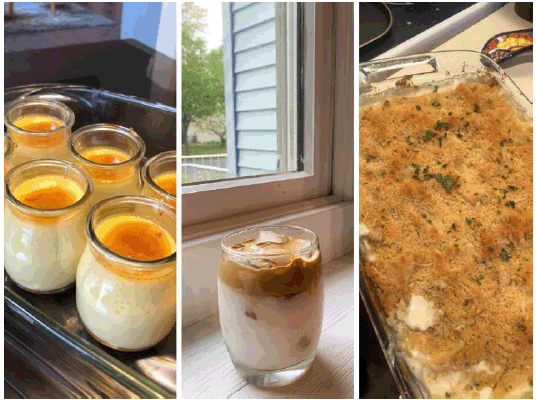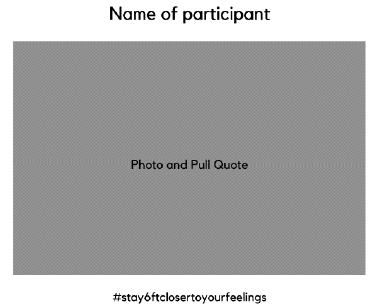OUWB APAMSA's Mental Health Initiative Campaign Poster in May, 2020.

Legend: Poster made by Jennifer L. Nguyen.
Han G. Ngo1, Brianna L. Gibney1, Paul Patel1, Jennifer L. Nguyen1
doi: http://dx.doi.org/10.5195/ijms.2020.684
Volume 8, Number 3: 305-306
Received 09 08 2020: Accepted 29 09 2020
The Asian Pacific American Medical Student Association (APAMSA) is a national student organization that advocates for the health of the Asian American Pacific Islanders. One of APAMSA's long-standing traditions has been the mental health initiative, where local chapters are encouraged to take action to promote mental health and wellness for their members and communities.1
In May 2020, our APAMSA chapter at Oakland University William Beaumont (OUWB) School of Medicine hosted a mental health campaign titled, “Socially Distant but Emotionally Connected: 6ft Closer During Quarantine” (Figure 1). Given the coronavirus pandemic and social isolation, we selected our existing APAMSA Facebook page as the platform to host our campaign. The campaign lasted two weeks and featured both written responses and video responses from medical students and faculty who wanted to share how they were coping with the pandemic. The goal was to create a space for everyone at OUWB to engage in meaningful conversations about mental health and support each other during this difficult time.
Figure 1OUWB APAMSA's Mental Health Initiative Campaign Poster in May, 2020.

From the mental health campaign, we soon discovered medical students and faculty members had a wide variety of thoughts and tips to share with their fellow peers. One student said, “nothing can quite replace the connection that is felt by the proximity of another person” when remarking on the — at the time — novel quarantine rules. Medical students had gotten accustomed to being around each other at school that we were flustered when isolation initially began. It was especially daunting for some students who were far away from their friends and family. However, the student also suggested that this was a perfect opportunity to reconnect with people one may have not heard from for a long time, saying, “I have enjoyed reviving old conversations and initiating new ones” and “it makes for great storytelling when months and years worth of accrued experiences are showcased in a spontaneous call.”
One of the faculty members provided a visceral account of his experience during the pandemic saying, “I would describe myself as often agitated, worried, depressed…numerous adjectives melded into a single troubled state.” He shared familial and work circumstances that had made the pandemic quite troubling for him. This was a tangible and genuine way to understand just how widespread the effects of the pandemic were even as an esteemed faculty member struggled in the same ways us students did. Nevertheless, he had warm words to support the students by saying, “While I have always said ‘my door is always open to you,' that means little nowadays. Perhaps it's better to say ‘I'm only an email or a phone call away.' I have always been and will always be, here for you.”
Numerous other medical students and faculty members shared their feelings about xenophobia, loneliness, and lack of motivation during the pandemic. However, they also added helpful tips on how to adapt to a new normal. Though the pandemic came with its share of difficulties and problems, we were reminded again how close our community is as a family and that we will always be there to support each other during these difficult times.
Over the course of our two-week campaign, each post was able to reach an average of 220 followers and had an average of 84 engagements according to Facebook analytics. Although our campaign could have reached out to more people through broadening our social media platforms to Instagram and Twitter, we considered it a success in the following ways. Firstly, by including the voices of faculty and students, our campaign was the first of its kind at our medical school to bring members of the community together to discuss mental health. This was evident when several medical students voluntarily reached out and asked to share their stories on our platform. Secondly, we included a daily mental health challenge component as a way to motivate students and faculty to engage with each other in a way that otherwise would not have been possible during social isolation. For example, some of the challenges included trying a new recipe and reconnecting with a faculty member (Figure 2). Many students sent in photos from our daily challenges and we featured them on our Facebook page. Through our initiative, the emotional support within our OUWB community was able to penetrate the barriers of social distancing.
Figure 2Photo Submissions from OUWB Students During the Daily Wellness Challenge.

Overall, the meaningful connection created by our campaign made it a worthwhile endeavor. Social networking sites such as Facebook make information more accessible, help reduce stigma about certain health conditions, and provide social support for the general public.2 In addition to the aforementioned benefits, an online health campaign can be held at no extra financial cost to the organization. We urge that other medical schools implement their own mental health awareness campaigns to destigmatize the topic in their communities. The following steps can be used to start the process:
Social Media Campaign Template for Each Participant's Post.

Mental health is a pertinent topic that is often overlooked in the medical school community. The theme of our campaign was #stay6ftclosertoyourfeelings during the pandemic, but we hope that regardless of the times, a long-lasting tradition of mental health promotion for medical students will be established.
None.
The Authors have no funding, financial relationships or conflicts of interest to disclose.
Conceptualization, Methodology, Resources, Writing – Original Draft, Writing – Review & Editing, Supervision, Project Administration: HN, BG, PP, JN.
1. APAMSA. Mental Health Initiative. Available from: https://www.apamsa.org/health-affairs/mental-health. Last updated Aug 1, 2020; cited Aug 6, 2020.
2. Moorhead SA, Hazlett DE, Harrison L, Carroll JK, Irwin A, Hoving C. A new dimension of health care:Systematic review of the uses, benefits, and limitations of social media for health communication. J Med Internet Res. 2013 Apr 23;15(4):e85.
Han G. Ngo, 1 BS, Oakland University William Beaumont (OUWB) School of Medicine, United States
Brianna L. Gibney, 1 BS, Oakland University William Beaumont (OUWB) School of Medicine, United States
Paul Patel, 1 BS, Oakland University William Beaumont (OUWB) School of Medicine, United States
Jennifer L. Nguyen, 1 BS, Oakland University William Beaumont (OUWB) School of Medicine, United States
About the Author: Han G. Ngo, Brianna L. Gibney, Paul Patel, and Jennifer L. Nguyen are second-year medical students at Oakland University William Beaumont School of Medicine, Rochester Hills, Michigan, USA of a 4-year M.D. program. We are part of the Asian Pacific American Medical Student Association (APAMSA).
Correspondence: Han G. Ngo. Address: 586 Pioneer Dr, Rochester, MI 48309, United States. Email: hngo@oakland.edu
Editor: Francisco J. Bonilla-Escobar Student Editors: Lakshmimathy Subramanian, Nikoleta Tellios Copyeditor: Nicole Katherine Conners Proofreader: Adam Urback Layout Editor: Judie Joo
Cite as: Ngo HG, Gibney BL, Patel P, Nguyen JL. COVID-19: Using Social Media to Promote Mental Health in Medical School During the Pandemic. Int J Med Students. 2020 Sep-Dec;8(3): 305-6.
Copyright © 2020 Han G. Ngo, Brianna L. Gibney, Paul Patel, Jennifer L. Nguyen
This work is licensed under a Creative Commons Attribution 4.0 International License.
International Journal of Medical Students, VOLUME 8, NUMBER 3, December 2020